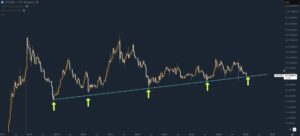The chair of the Federal Reserve discussed digital currencies at an IMF annual meeting earlier today, saying that a potential CBDC would be complimentary to the current US Dollar system.
In brief
-
US Federal Reserve chair Jerome Powell spoke at the IMF’s annual meeting, explaining his position on CBDCs.
-
Powell discussed cross-border payments and digital currencies, emphasizing the importance of “doing it right”.
-
His attendance and comments indicate that CBDCs are inevitable as currency wars unfold.
US Federal Reserve chair Jerome Powell spoke at the annual meeting of the International Monetary Fund (IMF) today, addressing cross-border payments and the prospect of introducing central bank digital currencies.
In February of this year, Powell alluded to the potential of digital currencies, describing Facebook’s Libra project as a “wake-up call.” He also said that the centrality of the US Dollar as a trusted and accepted currency is “an open question.” Today, Powell clarified the US’ plans for a so-called digital currency.
“There are a number of ways that a CBDC might improve the payments system, and it is mainly this area that motivates our interest,” Powell said during the meeting, identifying the main reason why the Fed would consider adopting a CBDC in the future.
Airing on the traditional side of finance, Powell spoke in a forward-looking manner, but ultimately weighed on the side of caution, underlining cyber security concerns, counterfitting, money laundering and the potential to change monetary policy via a CBDC.
He said: “For the Federal Reserve, our main focus is on whether and how a CBDC could improve an already safe, effective, dynamic and efficient domestic payments system.”
According to Powell, each country and its respective central bank must carefully consider their own stance on CBDCs.
In addition, Powell said that the United States, unlike other jurisdictions, already has a highly banked population. “We have a highly banked population so that many—although not all—already have access to the electronic payments system.”
“We do think it’s more important to get it right than to be the first,” Powell continued.
Of course, CBDC’s raise several concerns about their potential effect on individual liberties as well as the size and scope of the current private banking sector, among other things.
However, it appears that the US is in no hurry to be the first to develop and push a CBDC, and would rather focus on “getting it right” rather than being the first one out the door.
Ultimately, people around the world are going to be faced with the choice of choosing between private currencies (Libra), central bank digital currencies and public money like bitcoin as global currency wards unfold.
At the moment, central bankers cannot oust the current system due to widespread usage, but the trajectory towards a digitalised system is inevitable, and institutions like the Federal Reserve are well-aware of this despite not overtly expressing their interest.
Join the telegram channel for updates, charts, ideas and deals.


